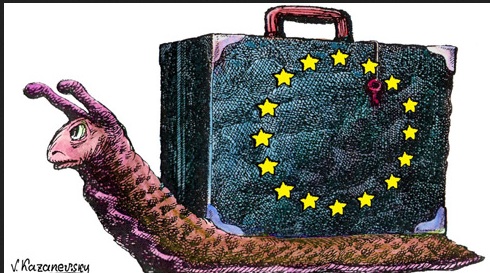Greek Prime Minister Alexis Tsipras and German Chancellor Angela Merkel sought to reboot an increasingly sour relationship,saying they are looking for ways to help Athens reach a deal with creditors that will keep it from falling out of the euro.
In his first visit to Germany since coming to power in January, Tsipras sounded a conciliatory note — though he stopped short of promising anything concrete on reforms that creditors like Germany want to see before they loan Greece more money.Greeurgently needs more funds as it faces a cash crunch within weeks.
Backtracking on some of his previous rhetoric blaming Greece’s problems on German insistence on budget austerity, Tsipras said he wanted to “break the stereotypes that have grown in the past five years: The Greeks are not lazy and the Germans are not to blame for everything.”
Tsipras said Merkel invited him to Berlin for talks as the tensions between the two countries increased, telling him “it is better to talk with one another than about one another.”
“I did not come here to ask for financial help,” Tsipras told reporters after meeting with Merkel behind closed doors for more than an hour. “I came for an exchange of our thoughts and opinions, to see where there is common ground and where there is disagreement.”
He characterized the talks as “positive,” saying he found Merkel “listens and wants to be constructive in the exchange of opinions.”
Merkel was careful to point out Germany was only one of the eurozone nations that would be responsible for deciding whether Greece’s reforms are sufficient for it receive more loans. She added that no decisions had been made in her talks with Tsipras.
“Today we can only talk about things,” she said, characterizing the meetings as being held in “a spirit of trust.”
The two continued their discussions over dinner following the press briefing.
Tsipras brought up reparations as he spoke alongside Merkel, but he said “there is no linkage at all with the financial crisis and the eurozone crisis — it is clearly a bilateral issue.”
He condemned as an “unjust provocation” a German magazine cover depicting Merkel amid Nazi officers by the Acropolis in Athens. And in a rebuke to his own justice minister, he said no one in Greece was considering seizing or auctioning off German property for war reparations.
“Please, let’s leave these shadows of the past behind us,” Tsipras said, stressing that the European Union (EU) was a force for stability in a troubled region.”
Merkel stuck to her government’s contention that “the question of reparations has been politically and legally settled” with a 1960 accord with Greece and the payment made at that time. But she noted Germany has earmarked $1.1 million annually for a “German-Greek future foundation” meant to fund remembrance and historical research projects, and “in this spirit we will talk with the Greek government further.”
Many Greeks blame the deeply unpopular bailout program administered by the European Commission, International Monetary Fund and European Central Bank for exacerbating Greek economic misfortune. The country’s unemployment rate is currently the highest in Europe, while Germany’s is the lowest — almost 26 percent compared to almost 5 percent.
Tsipras’s government agreed a month ago to push through reforms in exchange for keeping EU aid flowing, but has delayed submitting the measures for approval.
German officials have complained about their Greek counterparts making commitments and then publicly casting doubt on them, but also insist the debt spat isn’t a bilateral matter.











